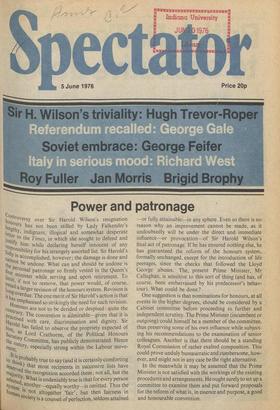Power and patronage
roversy over Sir Harold Wilson's resignation itnnours has not been stilled by Lady Falkender's letter indignant, illogical and somewhat desperate J.rto the Times, in which she sought to defend and rustifY him while declaring herself innocent of any fnesr nsibility for his strangely assorted list. Sir Harold's e-a„iY is accomplished, however; the damage is done and th—n°t be undone. What can and should be undone is fire Personal patronage so firmly vested in the Queen's st. minister while serving and upon retirement. To eittn.n, if not to remove, that power would, of course, fo 'ail a larger revision of the honours system. Revision is It rillg overdue. The one merit of Sir Harold's action is that Has emohasised so strikingly the need for such revision. co„.nnours are not to be derided or despised : quite the pr:trarY. The convention is aidmirable—given that it is t"ciZetised with care, discrimination and dignity. Sir hirold has failed to observe the propriety expected of senir ' .as Lord Crathorne, of the Political Honours theunnY Committee, has publicly demonstrated. Hence inenZutery, especially strong within the Labour move It is pr to th. obably true to say (and it is certainly comforting deserved Ink) that most recipients in successive lists have ma, the recognition accorded them; not all, but the seleoi°triAtY. What is undeniably true is that for every person syste eu, another—equally worthy—is omitted. Thus the hu,111 is not altogether 'fain but then fairness in " society is a counsel of perfection, seldom attained —or fully attainable—in any sphere. Even so there is no reason why an improvement cannot be made, as it undoubtedly will be under the direct and immediate influence—or provocation—of Sir Harold Wilson's final act of patronage. If he has ensured nothing else, he has guaranteed the reform of the honours system, formally unchanged, except for the introduction of life peerages, since the checks that followed the Lloyd George abuses. The. present Prime Minister, Mr Callaghan, is sensitive to this sort of thing (and has, of course, been embarrassed by his predecessor's behaviour). What could be done?
One suggestion is that nominations for honours, at all events in the higher degrees, should be considered by a Cabinet committee before proceeding to further and independent scrutiny. The Prime Minister (incumbent or outgoing) could himself be a member of the committee, thus preserving some of his own influence while subjecting his recommendations to the examination of senior colleagues. Another is that there should be a standing Royal Commission of rather exalted composition. This could prove unduly bureaucratic and cumbersome, however, and might not in any case be the right alternative.
In the meanwhile it may be assumed that the Prime Minister is not satisfied with the workings of the existing procedures and arrangements. He ought surely to set up a committee to examine them and put forward proposals for the reform of what is, in essence and purpose, a good and honourable convention.


































